Dental Implants Weatherford
Permanently Fill the Gaps in Your Smile
Dental implants are a state-of-the-art option for tooth replacement that has become the “gold standard” for restorative treatment. Our skilled dental experts use their training and available technologies to create beautiful smiles that function comfortably and properly. At Cosmetic & Family Dentistry of Weatherford, we perform both the surgical placement and restoration of dental implants, making the procedure convenient while also allowing you to remain with the dental healthcare providers you trust. If you’re missing teeth, contact our team to explore dental implants in Weatherford as a treatment option.
Why Choose Cosmetic & Family Dentistry of Weatherford for Dental Implants?
- Entire Dental Implant Treatment Completed Under One Roof
- State-of-the-Art Dental Technology for Precise Results
- Dental Insurance Welcome & Flexible Financing Available
What Are Dental Implants?

There are two parts to your natural teeth. There’s the shiny white crown that you see when you smile, and there’s the hidden root structure under the gums that holds them in place. Classic tooth replacement options like dentures and dental bridges only replace the crowns of missing teeth. While these restorations are certainly better than nothing, they lack optimal stability and functionality without a root structure. Dental implants, on the other hand, replace the entire structure of a missing tooth from crown to root!
A dental implant is a small titanium post that can be inserted beneath the gumline and into the jawbone to replace the roots of a missing tooth. On top of it, a custom-made restoration is secured to replace the visible portion of your smile. One or more dental implants can be used to replace any number of missing teeth. No matter how many dental implants you get, the result is a smile that looks and functions just naturally.
The 4-Step Dental Implant Process

After you have chosen to get dental implants, the first part of the procedure is to have them surgically placed into your jaw. For this, your doctor will make a small incision in your gums and place the small titanium posts that will serve as your new tooth roots. Often, this surgery only requires local anesthesia and any discomfort afterward can be easily managed with medication.
Are you aware of how dental implants work in Weatherford? If you’re considering permanent prosthetics to replace your missing teeth, it’s important that you understand the normal four-step process every patient must go through. While no two patient cases are alike, the same steps must be followed to ensure successful implant placement and long-term stability: initial consultation, dental implant surgery, osseointegration, and delivery of the final implant restoration.
Initial Dental Implant Consultation

The first step in this process is to meet with your implant dentist in Weatherford. This visit will include a full examination of your oral cavity using advanced dental technology as well as an evaluation of your overall health and jawbone density. It is necessary to determine if you possess any health-related issues, such as gum disease, tooth decay, autoimmune disorders, diabetes, and other conditions that can negatively impact the placement, fusing, and success of your dental implants.
If necessary, you may be required to undergo preliminary treatment in the form of periodontal therapy, tooth extraction, sinus lift, or bone grafting.
Dental Implant Surgery

The dental implant placement does require minor oral surgery but fortunately, our team can complete the entire placement and restoration in-house, under one roof. This allows you to remain with a familiar team throughout the entire process.
Your implant dentist will administer local anesthesia before making a small incision in your gums and placing the small titanium posts that will serve as your new tooth roots. The gum tissue is then closed, and protective healing caps are put into place while you recover at home.
Dental Implant Osseointegration/Abutment

Once your implants have been placed, you’ll be given 4-6 months to heal and allow the roots to naturally bond to the surrounding jawbone. It will be essential that you follow the instructions provided to you by our team, as these guidelines will help you heal quicker and avoid any potential complications. Once your gums and bone feel stronger and healed from surgery, you’ll be required to return to our office to receive your metal abutments that connect your implant to your customized restoration.
Delivery of Dental Implant Restorations

The final step in the process is to have your custom-made crown, bridge, or denture put into place. Made by talented technicians who follow the specifications provided by our team, you can expect your new teeth to look natural, feel comfortable, and offer maximum functionality when attempting to eat, speak, or smile. Once your teeth are in place, you can begin to enjoy all the many benefits dental implants in Weatherford can offer.
Benefits of Dental Implants

When you choose dental implants to replace your missing teeth, you’re choosing an option that allows you to feel comfortable, function properly, and look great at the same time. They help you maintain your natural facial shape and a smile that looks just like your old one. Dental implants are also very similar to natural teeth, which gives them a lot of advantages over options like fixed bridges or dentures. If you’d like to learn more about how dental implants can improve your quality of life, continue reading or give us a call today!
Day-to-Day Benefits

Many denture wearers believe that their prosthetic limits them from being able to enjoy life to the fullest. Well, that’s not a problem with dental implants! Thanks to their unique placement, they offer a range of day-to-day benefits, including:
- Regained ability to eat almost any food. Since dental implants replace the entire missing tooth structure, they’re able to withstand the chewing of virtually any food.
- Boosted self-confidence. Dental implants are crafted to suit your facial features perfectly, meaning you can enjoy a beautiful, natural-looking smile.
- Lower maintenance. With dental implants, you don’t have to worry about incorporating complex steps into your oral hygiene routine. Caring for your new smile is as easy as caring for natural teeth!
Health Benefits

Dental implants can improve more than just your day-to-day life – they offer some significant health advantages as well. Some of those include:
- Jawbone preservation. Because dental implants are placed inside the jawbone, they stimulate it to prevent its deterioration. That way, you can maintain an overall youthful facial shape for years to come.
- Prevent dental drift. It’s common for teeth to shift after tooth loss. Luckily, dental implants serve as a placeholder to ensure every tooth stays exactly where it belongs. You don’t have to worry about your pearly whites moving out of place!
- Improved overall health. Studies have revealed a correlation between tooth loss and an increased risk of multiple health conditions. Since dental implants are so similar to natural teeth, it’s safe to assume that they can help lower such risks.
Long-Term Benefits

With proper care and maintenance, you can enjoy many long-term benefits with dental implants, such as:
- High success rate. Dental implants have an impressive success rate of over 95 percent even 20 years after they’ve been placed!
- Youthful appearance. The titanium posts stimulate blood flow in the jaw, preventing deterioration and helping you avoid the sunken, aged look that often accompanies tooth loss.
- Long lifespan. Although dentures and bridges need to be replaced every few years, implants can last for decades without needing replacement.
Who Dental Implants Can Help

Dental implants can secure crowns, bridges, and full or partial dentures, giving you options that fit your specific pattern of tooth loss. Regardless of how many teeth you’ve lost, and where they are in the arches, we can devise an implant solution to replace these missing teeth. Our experienced team is here to guide you through the entire process and complete your smile. At your consultation, we can become familiar with your needs and goals, then we can put together a treatment plan designed specifically for you.
Who Is a Good Candidate for Dental Implants?

Unfortunately, not everyone who has missing teeth qualifies for implants. To be eligible for this treatment, you must have no oral problems, such as gum disease, be in good overall health, and have enough jawbone tissue to support the implants. During your consultation, we will check for these criteria, but even if you can’t get them initially, we can help you get into a better position to receive dental implants, whether it be through gum disease therapy, bone graft, or other treatment.
Missing 1 Tooth
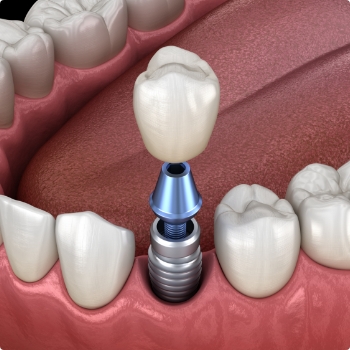
One of the most common ways we restore implants is with a single crown. Just one dental implant post is placed into the jawbone. Then, it’s covered with a custom-made crown that is made of 100% dental porcelain, giving it both the strength and appearance of a natural tooth. Unlike a traditional dental bridge, a dental implant does not require modifying the natural teeth that surround the gap, which means your smile stays as preserved as possible with this replacement option!
Missing Multiple Teeth
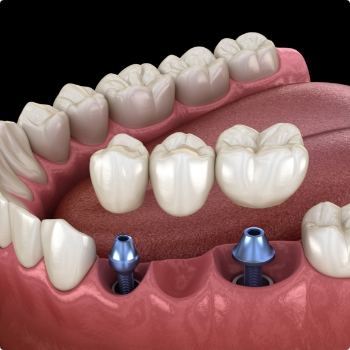
Much like a traditional dental bridge, an implant bridge can be used to replace a row of consecutive missing teeth. However, rather than anchoring to natural teeth, this type is attached to implants. One implant will be placed on either side of the gap to support a row of prosthetic teeth between them. As a result, you can substitute for several lost teeth using only two implants instead of one implant per missing tooth.
Missing All Teeth
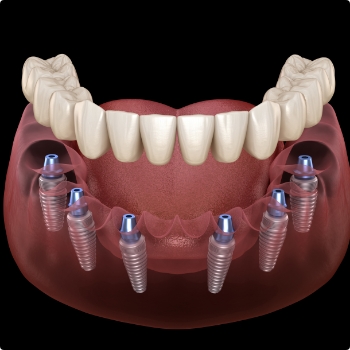
Four to six dental implants can be used to anchor a full denture into place. While implant dentures may look like normal dentures, they have a variety of advantages over traditional ones. Once they are being held in place with dental implants as opposed to just natural suction or denture adhesive, they are much more stable, and you won’t have to worry about them slipping or clicking. The implants support your jaw from the inside, and this prevents the bone recession that often makes a new set of dentures lose their fit after just a few years. They also enable a patient to eat a wider variety of foods more comfortably because they allow for a much stronger bite force than traditional dentures.
Alternatively, patients missing all their natural teeth may qualify for All-On-4 dental implants. This method allows people who don’t have enough healthy jawbone to support traditional implants to get an implant denture. It involves strategically placing four implants to provide maximum support. Two posts are located at the front of the jaw where the bone is naturally thicker, and two posts are placed at the back of the jaw at an angle. With just these four posts, a patient can enjoy an entire arch of new teeth.
Learn More About Implant Dentures
Missing Teeth With Low Jawbone Density
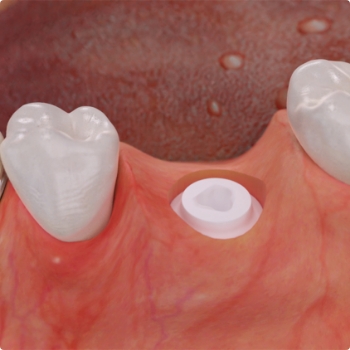
To get dental implants, a person needs to have an adequate amount of healthy jawbone to support the new titanium roots. For people who have suffered extensive tooth loss, their jaw may be thin and brittle, which would normally disqualify them from getting dental implants.
However, they can now get mini dental implants. As the name suggests, they are only a fraction of the size of regular implants and allow even more people to get the most reliable tooth replacement option available today.
Understanding the Cost of Dental Implants

Dental implants are a long-term investment in your confidence, health, and quality of life. Since every dental implant treatment is uniquely customized to the needs and preferences of an individual patient, there is no set price for them. What you can expect to pay will depend on a variety of different factors, including how many dental implants you need and the current status of your oral health. While dental implants initially cost more than traditional tooth replacement options like dentures or dental bridges, they have the potential to save you thousands of dollars in the long run. Read on as we cover everything you need to know about the cost of dental implants in Weatherford.
Preliminary Treatments & Dental Implant Surgery

Before you begin your journey toward your brand-new smile, you may need to complete one or more preliminary treatments to become a good candidate. Cavities, gum disease, and jawbone deterioration can all pose a threat to the success of your dental implant treatment, so these extra procedures are an essential expense for your new smile.
Once you’ve completed any necessary preliminary treatments to become a good candidate, we’ll need to consider the cost of the dental implant placement surgery itself. This price can vary based on where in the mouth the implants are being placed and what type of sedation you choose. We’re proud to perform every step of the dental implant treatment process right here in our office, saving our patients the time and money of seeing an unfamiliar specialist.
The Parts of Your Dental Implant
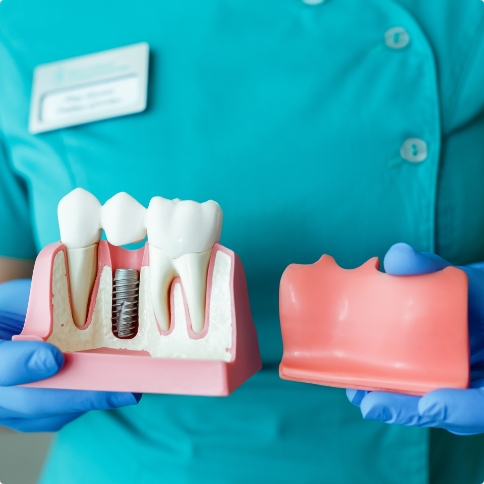
Next, we’ll need to determine the price of your dental implant or implants themselves, which will depend on variables like:
- Number of dental implants: While the price for your treatment will go up with every dental implant you need, the individual price of dental implants typically goes down.
- Type of restoration: Small restorations like single crowns cost less than larger restorations like dentures. However, keep in mind that it is often much more cost-effective to have multiple missing teeth replaced with a denture rather than individual crowns.
- Size or material: Dental implants can be made of titanium, zirconia, porcelain, ceramic, and many other materials, all of which will influence the final price.
- Brand of dental implant: We only use dental implants from highly-reputable brands with trustworthy products to ensure our patients receive the best dental implants possible. If you’d like to learn more about where your dental implant is coming from, don’t hesitate to ask.
How Dental Implants Can Save You Money

Dental implants are widely considered to be the gold standard of tooth replacement. Not only do they offer a wide range of benefits for your day-to-day life and health, but they can end up being far more cost-effective than dentures or a dental bridge in the long run. While these traditional restorations need to be replaced every five to seven years, dental implants have the potential to last a lifetime, which can save you thousands of dollars in replacements alone over the years! Plus, with dental implants, you won’t need to pay for frequent readjustments or special oral hygiene products. What’s more, studies show that replacing missing teeth can even lower your oral healthcare and cardiovascular care costs. However, perhaps most importantly, patients agree that the confidence and quality of life dental implants can restore is truly priceless.
Does My Dental Insurance Cover Dental Implants?

Currently, most dental insurance companies do not offer coverage for dental implants, although this is gradually changing. Even if your dental insurance policy doesn’t cover dental implants, it will likely cover parts or portions of your treatment, such as preliminary treatments, consultation, sedation during implant placement, and the final restoration. Our knowledgeable team will be happy to review the details of your insurance plan and ensure that your benefits are being maximized.
Making Dental Implants Affordable

Dental insurance isn’t your only option for making dental implants affordable. In addition to our limited-time special offers, we’re proud to offer our patients the CareCredit card for dental care services. Qualifying patients can choose from a variety of low- to no-interest monthly payment plans to sign up for, allowing them to begin their dental implant treatment and break up its final cost into smaller, more manageable monthly payments. You can apply for CareCredit online or give us a call to learn more!
Maintaining & Caring for Your Dental Implants

Are you ready to permanently fill the gaps in your smile? Dental implants are designed to last 30 years or longer, but most patients can easily count on their new smile to last a lifetime! That is, however, only if they’re taken care of correctly. Fortunately, taking care of dental implants is as easy as taking care of your natural teeth! Here are the five best ways to make the most out of your dental implants.
Make Oral Hygiene a Priority

Even though your new teeth will look natural, they won’t be able to get cavities. However, you’ll still need to brush your teeth for two minutes twice a day and floss daily if you want them to last! The most common cause of dental implant failure is an infection in the gums called peri-implantitis, which is typically the result of poor oral hygiene. Brushing, flossing, and rinsing with mouthwash regularly is the easiest and most effective way to keep your gums healthy and infection-free.
Eat a Healthy Diet

Dental implants can restore 80% or more of your natural chewing and biting power. Make sure to take advantage of this excellent benefit by eating a full, varied, and nutritious diet! Overindulging in sweets and hard foods can wear down your implant and restoration, as well as your remaining teeth. Instead, eat plenty of lean protein, low-fat dairy products, fresh fruits, and raw vegetables! Foods with calcium and vitamin C will help keep the structures supporting your dental implant strong.
Break Bad Habits

If you’re serious about making the most of your investment, it’s time to quit certain bad habits once you get dental implants, like:
- Smoking: Dental implant failure is more common among those who smoke, as smoking lowers your body’s ability to fight off infection and can interfere with osseointegration.
- Chewing on hard items: Chewing on things like ice, pen caps, and your fingernails will wear down your restoration, and can potentially break it over time.
- Using your teeth as tools: Using your teeth to open containers, rip off price tags, hold an extra bag of groceries, or as any other type of household tool can break your restoration in a flash.
Protect Your Dental Implants

Dental implants are strong, but they’re not indestructible. If you play sports or grind your teeth in your sleep, you need to wear a custom mouthguard. Sports and teeth grinding can both potentially damage your restoration and loosen your dental implant, so it’s vital that you take the proper steps to protect it. We can provide you with a custom-made sports mouthguard or nightguard for bruxism to ensure your pearly whites are protected when you head to the field or bed.
Schedule Regular Dental Checkups
No matter how many of your natural teeth you’ve replaced with dental implants, you still need to get regular dental checkups and cleanings! When you visit us every six months, we’ll examine your smile during your checkup to ensure no issues are developing. Then, we’ll give you a thorough cleaning to clear away lingering plaque and tartar buildup to help prevent any problems in the future.
Dental Implant Failure & Salvage

In the vast majority of cases, dental implant treatment successfully provides long-lasting, reliable tooth replacement. However, there is still a small chance that something could go wrong. For example, an infection might lead to dental implant failure. If you ever believe that is happening to you, get in touch with our team right away. We will assess the problem and design a treatment plan with the goal of restoring your smile’s strength, health, and function as efficiently as possible.
Dental Implant FAQs
Dental implant treatment is a major commitment, so it’s only natural to have questions before you’re comfortable beginning the process. Our team wants you to feel confident that you’re making the right decision for your smile, which is why we’re happy to address your concerns when you visit us for a dental implant consultation. In the meantime, we’ve provided the answers to a few questions about dental implants that we get asked most frequently. We look forward to meeting you!
How Soon After a Tooth Extraction Can I Get Dental Implants?
It depends. Some patients can receive dental implants immediately after their teeth are removed, while others may need to wait several months for the jawbone and gum tissue to heal. However, waiting too long after tooth extraction may cause the jawbone to deteriorate to the point where bone grafting is necessary before implant placement. If you need to get a tooth removed and you’re interested in replacing it with a dental implant, let our team know. From there, we can plan your treatment accordingly.
Do I Need a Bone Graft Before Getting Dental Implants?
The answer to this question also varies. If it has been quite some time since losing your teeth, then there’s a high chance that you’ll need to undergo a bone grafting procedure before you can receive dental implants. This is because, without support from your tooth roots, your jawbone begins to deteriorate over time. Eventually, it may become too weak to support implants. During your consultation, we’ll capture detailed images of your jaw to determine whether the bone needs to be strengthened or whether we can move forward with dental implant surgery.
How Long Do Dental Implants Last?
Research shows that, even after more than a decade, over 95% of patients with dental implants are still enjoying their new teeth to the fullest. On average, a dental implant can last for about 30 years, but its lifespan depends primarily on how well you take care of it. Dental implant maintenance is relatively simple; just remember to maintain a daily oral hygiene regimen and visit our office every six months for your routine checkups. That way, if there’s a problem with your implant, we can treat it in the early stages and help your implant last even longer.
Do Dental Implants Feel Natural?
Once you have recovered from your dental implant surgery and the posts have fully integrated with your jawbone, your implants should feel just like the teeth you used to have. In fact, you might even forget that your teeth even went missing at all! This is due to their unique structure; by recreating every part of a missing tooth, including the root below the gumline, a dental implant is the closest thing to having the old tooth back.
Does Getting Dental Implants Hurt?
Before placing your dental implant, our dentist will administer a local anesthetic to ensure that the procedure is completely painless, and you may receive dental sedation treatments if you need a little extra help staying comfortable. While you can expect to feel no pain during the surgery, your mouth may be sore for a few days afterward. Since the jawbone contains relatively few nerve endings, this discomfort should be mild and easily managed with prescribed or over-the-counter pain relievers. Cold compresses or ice packs may also be helpful, but please call our Weatherford office if your discomfort seems to be getting worse after a few days instead of better.
Are Dental Implants Safe?
Dental implants are incredibly safe and successful when placed by a qualified professional in a patient with adequate oral health. To make sure that no one receives implants before they are ready, we require each patient to have a consultation at our office to make sure that they are a suitable candidate. In some cases, a patient who is not ready for dental implants may be able to receive them later after undergoing preliminary treatments like bone grafts or gum disease therapy. While certain medical conditions like diabetes or cancer can make placing dental implants more complicated, we can discuss these issues and develop a suitable treatment plan during your consultation.
How Successful Are Dental Implants?
Dental implants placed by a qualified professional boast an amazing success rate of over 95% even ten years after placement, but the true determining factor in how long your new teeth will be able to last is how well you take care of them. By practicing excellent oral hygiene, eating a healthy diet, and attending regular dental exams and cleanings at our Weatherford office, you can set your implants up to last for decades or even a lifetime. However, implants that endure more pressure, such as those replacing molars, may fail sooner than those replacing teeth that bear less force.
What Can Cause Dental Implants to Fail?
While dental implant failure is quite uncommon, it is usually caused by peri-implantitis or failed osseointegration. Peri-implantitis is a type of gum disease resulting from poor oral hygiene habits, and it can loosen an implant by damaging the gum and bone tissue supporting it. Failed osseointegration refers to when the titanium post serving as the base of the implant does not adequately bond with the surrounding bone tissue, preventing it from developing the strong foundation it needs to function well and last long. Dental implants can also fail due to factors such as frequent teeth grinding, a tobacco habit, improper oral hygiene, certain medications, the head or neck being exposed to radiation, or health conditions such as diabetes, cancer, osteoporosis, and autoimmune disorders. After you receive implants, we’ll be certain to provide you with guidelines for keeping them in great shape for as long as possible.
I Need a Checkup & Cleaning I Need Help with a Lip and/or Tongue-Tie I am Worried About Gum Disease I Have a Cavity or Broken Tooth I am Missing One or More Teeth I Want to Enhance My Smile I Want a Straighter Smile I Have Jaw Pain I am Scared of the Dentist I'm Having Trouble Sleeping I Have a Dental Emergency View Our Services
